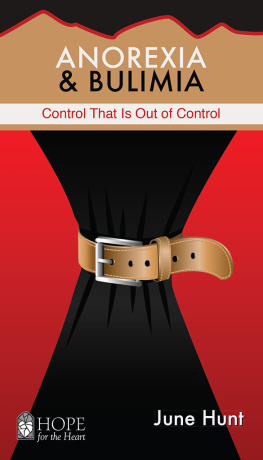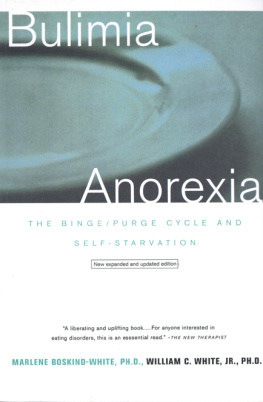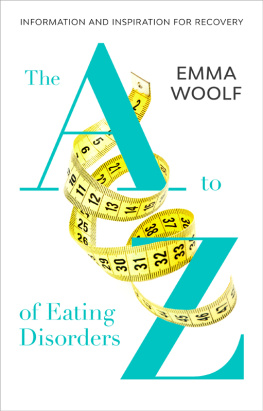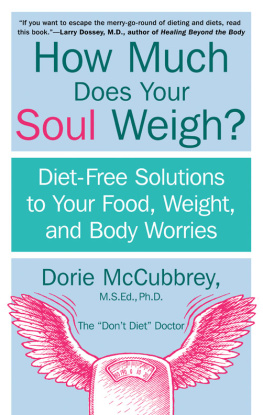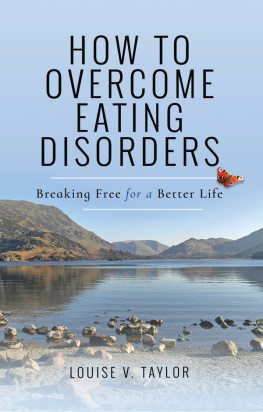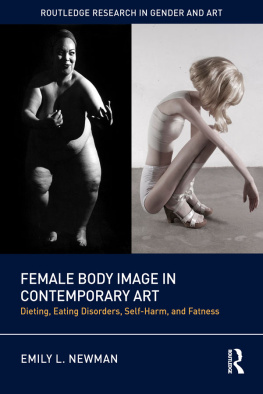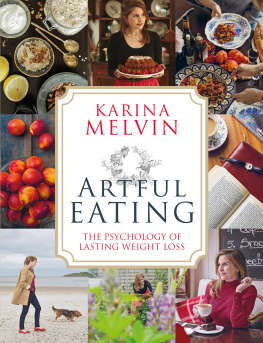CONSUMING PASSIONS
CONSUMING PASSIONS
FEMINIST APPROACHES TO WEIGHT PREOCCUPATION AND EATING DISORDERS
Edited By
CATRINA BROWN
AND
KARIN JASPER

CANADIAN CATALOGUING IN PUBLICATION DATA
Main Entry under title:
Consuming passions: feminist approaches to
weight preoccupation and eating disorders
ISBN 0-929005-42-2
1. Eating disorders. I. Brown, Catrina
II. Jasper, Karin
RC552.E18C66 1993 616.8526 C93-093732-5
Copyright 1993 by Catrina Brown and Karin Jasper
Edited by Beverley Beetham Endersby
Printed and bound in Canada
Second Story Press gratefully acknowledges the assistance of the
Ontario Arts Council and the Canada Council
Published by
SECOND STORY PRESS
7610 Bathurst Street
Toronto, Ontario
M5S2R6
CONTENTS
Catrina Brown and Karin Jasper |
Kim Shayo Buchanan |
Catrina Brown |
Beth MacInnis |
Donna Ciliska |
Helen Jefferson Lenskyj |
Farah M. Shroff |
Catrina Brown |
Robyn Zimberg |
Andria Siegler |
Niva Piran and Karin Jasper |
Catrina Brown |
Karin Jasper |
Patti McGillicuddy and Sasha Maze |
Connie Coniglio |
Ellen Driscoll |
Maxene Adler |
Sandy Friedman |
Jan Lackstrom |
Niva Piran |
va A. Szkely and Patricia DeFazio |
Karin Jasper |
Donna Ciliska |
Suzanne Bell |
Catrina Brown and Robyn Zimberg |
Merryl Bear and Alisa Gayle |
Karin Jasper |
ACKNOWLEDGEMENTS
Many people have shared in the production of this book. We thank, first of all, the contributing authors for making their knowledge and experience available here and for putting aside the many demands on their time to work on these essays. The partnership of the women at Second Story Feminist Press not only made this project possible, but made working on it a pleasure. In particular Lois Pikes considerable organizational talents and sense of humor helped keep the project on track, in more ways than one. To Beverley Endersby, the editor, we extend our appreciation especially for her thoroughness with the first draft and for her willingness to adjust to our timelines. We also want to acknowledge the partnership we have built with one another through the mutual support and mutual challenge this project has required. Finally, we are deeply appreciative of our clients for what they have taught us and what they have given to us.
Special thanks from Karin: I thank Allison for putting up with my bear-in-the-cave routine during this project and for expressing the fact that she didnt like it. For handling more than half of our shared responsibilities while I worked on this book as well as for his conversation and editorial comments, I thank Sandy. Most of all I appreciate the quality of attention he brings to what he does. I also thank my colleagues at the College Street Womens Centre for the encouragement and enthusiasm they expressed for this book, as well as their cheerful acceptance of a lesser contribution from me while I have been working on it.
Special thanks from Catrina: I am indebted to Don Forgay for his invaluable and ongoing care, support, encouragement, and intellectual challenge which have nourished me through this book and over the past ten years. I have relied upon and benefitted from his generosity and ideas, and my work has been enriched and deepened.
We are grateful to Don for suggesting the name we chose for the book.
PREFACE
Over the past ten years significant challenges have been made to the coercive and tyrannical ideal of thinness and the pressure it puts on women to diet. While most women continue to police and control their bodies in an effort to attain this ideal, increasing numbers have discovered that dieting does not work and have begun to realize that it is possible to live free from weight preoccupation and chronic dieting. These women are learning to accept their bodies as they are, in their various shapes and sizes. Instead of enduring constant hunger, self-denial, deprivation, and preoccupation with food and eating, these women have empowered themselves to eat without guilt, to enjoy their bodies, and to live in peace with themselves. We hope the writings of women in Canada who have contributed to these changes can help others to establish a sense of freedom from weight preoccupation and eating disorders.
This book encourages women to liberate the pleasures of their bodies, to accept their desires and appetites, and to enjoy the power of a full, embodied existence. It affirms the belief that women are participants in their own making. Thus, while we recognize that eating disorders and weight preoccupation have a social context, we do not subscribe to the view that women are simple puppets of a patriarchal society. We especially want to avoid the commonly accepted conclusion that societys obsession with weight is predominantly a product of pernicious media influence. Such a perspective degrades women by falsely assuming their passivity and inevitable victimization.
In order to understand complex behaviours, attitudes, and experiences, we must get beyond simplistic explanations for them. If we want to foster the empowerment of women, we cannot focus on the narrow issue of womens conformity to the tyranny of slenderness. Despite the asymmetrical power relations and inequalities of social conditions between men and women that characterize most aspects of life in modern society, we can act individually and collectively to empower ourselves and create social change.
We believe this collection of essays benefits not only individual women who are trying to understand their own weight preoccupation, but therapists and other helpers who want to provide caring, knowledgeable, and effective support to women who seek their help. While critiques of the social pressure to be thin have become quite common among feminists and within the womens health movement, very little has been written to guide us in practice. This book aims to go beyond the debunking of the beauty myth by opening a discussion among therapists, community workers, and activists of some of the ways to adopt in practice a fat-positive, nondiscriminatory, and pro-woman approach, and by encouraging individual women who want to be free of the endless cycles of dieting and weight preoccupation to use this book to help themselves.
We have tried to be as comprehensive as possible within the scope of a single volume, choosing to emphasize issues not previously widely discussed from a woman-centred perspective. This book explores childhood trauma, alcoholism, sexual abuse, and sexual violence in relationship to the development of eating disorders and weight preoccupation. It also challenges the effectiveness of dieting, some commonly held notions about healthy eating and exercise, and the oppression of fat people in our society. It examines feminist ways of working as clinicians and activists, challenging the traditional medical model in which the individual is separated from her social and cultural influences. In broad terms, the essays collected here place weight preoccupation, eating disorders, and our experiences of our bodies within the context of Western patriarchal society. By intentionally avoiding the construction of a monolithic set of arguments or ideas for practice in this book, we encourage the reader to enter into dialogue with the diverse points of view represented by the contributing authors.
Next page

